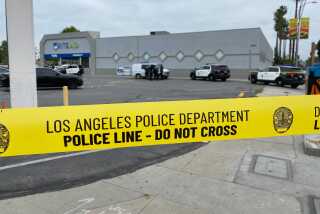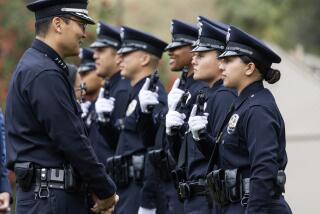Readers React: How much should tragic events like Tamir Rice’s death change policing?
- Share via
To the editor: Your editorial suggests preparing for atypical scenarios like that of Tamir Rice, the 12-year-old Cleveland boy who was killed by police after playing in a park with a toy gun. It also cites the importance of addressing racial issues, yet acknowledges there may be an overemphasis on them. (“Shootings show tactics and judgment of U.S. police forces need to change,” editorial, Jan. 3)
I offer a different viewpoint altogether: We should not shape police practices around one-off events.
Rice’s death was indeed tragic, but we must recognize that it happened only once. Police regularly face out-of-the-ordinary situations, and the vast majority are resolved without a shot fired.
Regarding race, there are countless peaceful and justifiable interactions between police offers and civilians of different races every year. Crafting policies around the handful that go disastrously wrong would be irrational.
Our guidance for police should be molded around concrete data, not outlying incidents that turn into trending topics or make headlines.
Lucas Klein, Claremont
..
To the editor: Your editorial was well thought out and rightly discussed many of the recent incidents that have caused great controversy.
However, I was surprised that you left out two considerations that I feel are incredibly important if we want a truly professional police force and not just a band of shoot-first cowboy types. Those would be much higher salaries and higher educational standards in hiring.
Instead, what we often have leading the way politically is the “no new taxes” crowd that wants to limit salaries and seemingly does not mind a lot of excessive force and shoot-em-up scenarios.
Most true professionals are well educated and well paid. Unfortunately many people dislike cops because they give tickets and rank them only slightly above those who dig up our streets and collect our trash, forgetting that they have the power to make life-or-death decisions.
Patrick Stalnaker, San Diego
..
To the editor: After stating that the appropriate question is whether officers could have used alternatives that were likely to result in better outcomes, you say that it is a standard of performance that is met by police elsewhere and give Great Britain as an example.
However, a more realistic example would be a country with as high a per-capita gun ownership rate as the United States, a country in which police have to anticipate in every situation that someone will be armed with a gun, whether or not that is the reality.
Oh, wait, there is no country other than the United States where that is the case.
Charles Goldwasser, West Hollywood
Follow the Opinion section on Twitter @latimesopinion and Facebook
More to Read
A cure for the common opinion
Get thought-provoking perspectives with our weekly newsletter.
You may occasionally receive promotional content from the Los Angeles Times.






